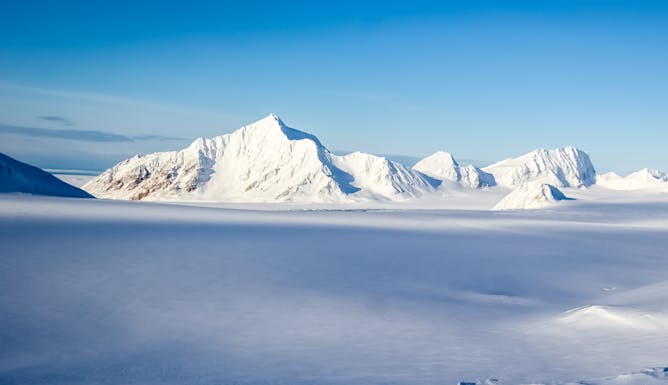|
|
|
|
Set sail northwards from the Shetland Isles and after 400 miles you’ll cross the Arctic Circle. Travel a further 800 miles, deep into the Arctic, and you’ll eventually reach the ice-covered archipelago of Svalbard, one of the most remote inhabited places on Earth. Svalbard is perhaps best known for its polar bears and ecotourism, but it’s also well-known among climate scientists for its huge and relatively easily studied glaciers, which unfortunately find themselves in one of the fastest-warming parts of the world.
Brice Noël and Michiel van den Broeke report on their latest research and explain why Svalbard is particularly vulnerable to climate change. Eventually the glaciers will recede, they say, and the landscape will start to resemble modern-day Iceland.
We also have an analysis of the situation in Belarus by a professor of human rights law. He says the reaction of international human rights institutions has not been proportionate to the magnitude of the crisis. Meanwhile, companies whose staff are working remotely are trying to replicate the chance interactions we have in physical workplaces with a variety of “virtual water coolers” – but this is much harder than it sounds.
|
Will de Freitas
Environment + Energy Editor
|

|
|

Kris Grabiec / shutterstock
Brice Noël, Utrecht University; Michiel van den Broeke, Utrecht University
Our research found these remote Arctic islands are particularly vulnerable to climate change.
|

Svetlana Tsikhanouskaya, the exiled Belarusian opposition candidate, speaking at the EU parliament on September 21.
Stephanie Lecocq/EPA
Kanstantsin Dzehtsiarou, University of Liverpool
Why haven't international and European human rights organisations done more to protect the human rights of Belarusians?
|

Spontaneous conversation between colleagues was easier in pre-covid times.
wavebreakmedia / Shutterstock.com
Paul Levy, University of Brighton
For as long as there has been remote working, companies have sought ways to replicate the serendipitous conversations we have in a physical work space.
|
Health + Medicine
|
-
Samantha Vanderslott, University of Oxford
Public trust is key to a successful immunisation programme.
-
Vassilios Vassiliou, University of East Anglia; Ranu Baral
Although they remain untested as a treatment, this suggests these drugs could be used as a therapeutic against the coronavirus.
-
Peter Francis, Leeds Beckett University
Plantar fasciitis is a common injury.
|
|
Politics + Society
|
-
Daniel Wincott, Cardiff University
Brexit could leave key sectors struggling and the devolved administrations have little power to do anything about it.
-
Claire Warrington, University of Brighton
Lockdowns have a key role in controlling COVID-19 but we must be aware of the risks of isolating people who are vulnerable to suicidal distress.
-
Hussa Khalid, Loughborough University
Sports diplomacy has eased relationships between nations before – here's how it could help Israel, Bahrain and the UAE as they enter into new peace accords.
|
|
|
|
Education
|
-
Simon Nicholas Williams, Swansea University
Universities should be open to changing their teaching models, and should keep student vulnerability in mind when designing courses during the pandemic.
|
|
| |
Featured events
|

|
Lecture Theatre 1, Richmond Building, Portland Street, Portsmouth, Hampshire, PO1 3DE, United Kingdom of Great Britain and Northern Ireland — University of Portsmouth
|

|
Blavatnik School of Government, Radcliffe Observatory Quarter, Oxford, Oxfordshire, OX2 6GG, United Kingdom of Great Britain and Northern Ireland — University of Oxford
|
|
|
|
| |
| |
| |
| |
| |
|
|
|
|
|
|
|